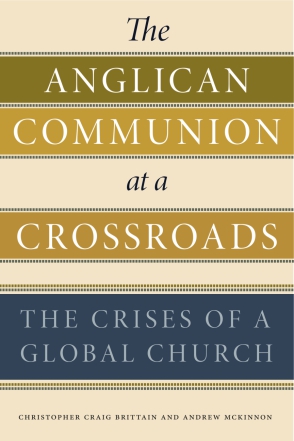The Anglican Communion at a Crossroads: The Crisis of the Global Church

In his most recent book, “The Anglican Communion at a Crossroads,” Trinity’s Dean of Divinity and Margaret E. Fleck Chair in Anglican Studies Prof. Chris Brittain explores the tensions dividing the Anglican community. Along with co-author Andrew McKinnon, Prof. Brittain discusses the issues that have pushed the Communion to this critical crossroads. We sat down with Prof. Brittain to learn more about his book.
What major crises of the Anglican Church do you explore in your book?
The book focuses on a series of crises in the global Anglican Communion, supposedly caused by disagreement over same-sex relationships. It shows, however, that also significant are the disagreements over leadership by women, postcolonial tensions between the global North and global South, and the difficulty of establishing appropriate governance structures for global organizations.
What motivated you to write on this topic? Why is it especially important now?
I was not convinced that existing explanations for the tensions in the Anglican Communion were adequate. One encountered a lot of stereotypes and simple answers in the media and among some leading spokespeople. Because of this, I thought that a book was needed at this time to help Anglicans better understand their situation as they thought about their church’s future.
 In your book, you explain how these major conflicts are symptomatic of long-simmering issues. Why have they come to a head now?
In your book, you explain how these major conflicts are symptomatic of long-simmering issues. Why have they come to a head now?
Tensions in the global church threaten schism to a greater extent now than in the past for a number of reasons. The first is the impact of globalization and social media. Anglicans encounter the differences that exist in the Communion much more easily and quickly than they have in the past – through easier travel and the internet. The blogosphere accelerates the pace of argument, and without requiring conflicting parties to meet face-to-face. Recent processes of de-colonialization and the granting of more autonomy to local churches also make it evitable that more disagreements will emerge – because there is now greater diversity at the decision-making table.
You do not believe these crises to be insurmountable. Why is that?
Yes, the Communion’s crises are surmountable. My colleague and I encountered a lot of goodwill still exists between Anglicans across the globe. This is a powerful resource for church leaders to build on. Moreover, Christians are called to live in hope, and so we should never consider a problem to be insurmountable.
What do you believe the future holds for the Anglican Communion beyond this crossroads?
The future will hold a great deal of change. The real question is: Will Anglicans continue to want to maintain a relationship with those Anglicans who hold difference views from their own? I suspect that most will continue to value these relationships. To achieve this, however, will require new governance structures to evolve, and more mature ways of responding to disagreement and tensions.
Click here for more information on “The Anglican Communion at a Crossroads”
Categories: Faculty & Staff; Theology


